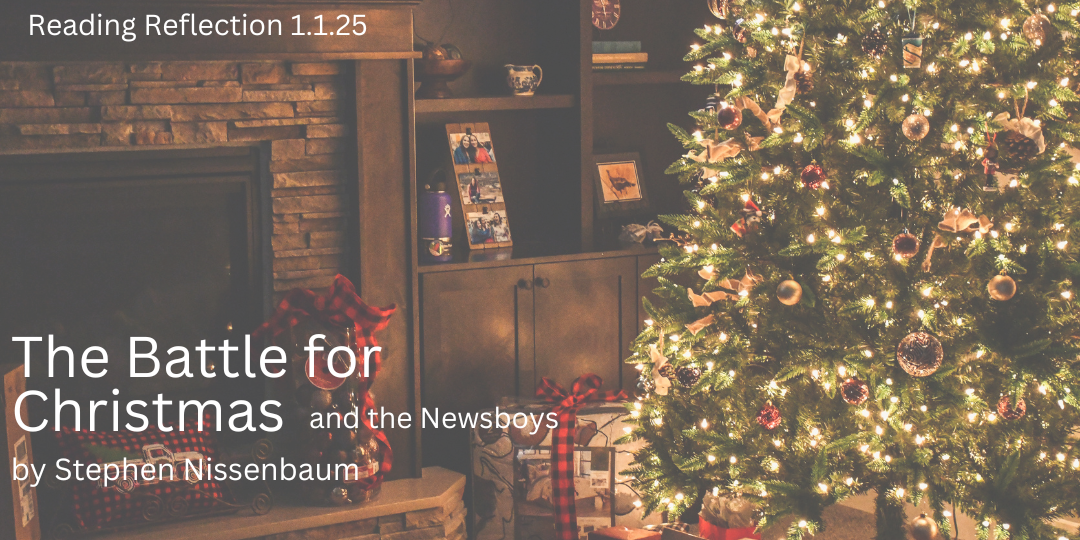More thoughts about Stephen Nissenbaum’s The Battle for Christmas, about the evolution of Christmas during the 19th century. The first two installments can be found here, and here.
Charles Loring Brace was a writer, minister, and social reformer in the mid 19th century. He was known for writing Home-Life in Germany, in which he notes that the Germans had better family values, at least vis-à-vis Christmas, than Americans. In his return to NYC, though, he gets into helping the poor, specifically helping children. He came to believe that helping poor adults was a fools’ errand, even the wives, who were often poor because of their husbands’ behavior, and their inability, in those days, to do their own thing. He figured that even if the bad husband was removed from the home, the wife was too far gone, and notes that it was oblivious, because so many poor women had “let themselves go” and were dressing shabbily. The cult of domesticity was in full force at the time, an idea that Brace didn’t seem to subscribe to. Mother, to him, doesn’t always know, or do, best. The kids, he thought, were better off without poor parents. Brace sympathized with the European revolutionaries in 1848 Europe, and with the abolitionist movement, but had no sympathy for poor adults in his own hometown. Children, on the other hand, he thought he could save.
Brace first worked for the Five Points Mission helping the poor, but in 1853 started the Children’s Aid Society. Here, regarding labor and class, Nissenbaum notes that he becomes part of a new class of workers just emerging at the time: the salaried managerial class. He was apparently a good manager, and good with kids. Brace first starts finding poor children and convincing either them or their parents that they should move to the West. The West, he thought, would give boys a chance to learn a trade, be resilient and independent self-reliant. These were the traits that in 1893 Fredrick Jackson Turner would ascribe to the frontier decades later, and here Brace is putting children on Orphan Trains for the same reasons. Weirdly, he never checks up on them. It would be interesting to study what became of these boys, an estimated 90,000, who were sent West in the second half of the nineteenth century.
Next, and maybe most successfully, Brace takes in the Newsboys, who, since the rise of the penny press in the 1830s, had been working the streets of New York, hawking papers. Newsboys were often orphans and were, it seems, in a class of their own at the time. Brace opened the Newsboys’ Lodging House in 1854 to house, educate and feed the boys, and by 1867 there were 5 lodges in NYC. He encouraged competitiveness, individuality and ambition, I guess the same traits the West was meant to instill in the kids on the Orphan Trains. He also wanted the Lodges to be “joyful and cheerful” and put on lavish Christmas dinners for the boys, most of which were paid for by rich philanthropists and attended by the same, including, from 1870-73, Theodore Roosevelt.
Also of note here: Brace published a series of “Scenes for Christmas” in papers to get support for the CAS. One of these is where he makes his opinion on women discussed above clear. Another, “The Cold Home,” is the only time girls are mentioned in this section (at least so far). Here he tries to convince a girl’s mother to let her go to an industrial school. It’s unclear by the summation if this is a boarding school, but all of those on the trains and in the lodges are boys. He is said to have wanted to help children, but were the daughters, to him, lost causes like their mothers? He also published a book in 1882 called Gesta Christi, in which he describes Jesus and the New Testament teachings as at least socialist, if not communist. According to Nissenbaum, Brace was distrustful of capitalism, but even in this book he’s hard to pin down exactly.
#fredrickjacksonturner #fjt #frontierthesis #orphantrain #christmas #poverty #newsboys #nyc #19thcentury #childrensaidsociety #charlesloringbrace
You can support my work by Buying Me a Coffee, or purchasing from my Kindle Wish List. Thanks! I appreciate you!
If you’d like to read along, you can find The Battle for Christmas here. (affiliate link, thanks!)
There’s a book about the Charles Brace, the Orphan Trains and the Children’s Aid Society on Amazon as well, here. (also an affiliate link, thanks again.) I haven’t read it yet, but it’s on my list.
Gesta Christi can be read here for free on Internet Archive.

